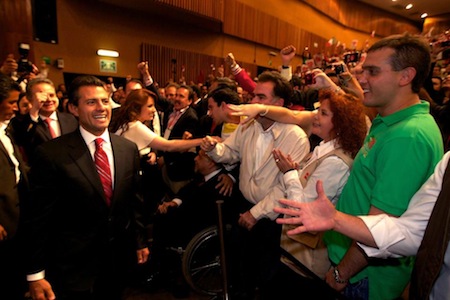It’s been over half a month since Enrique Peña Nieto’s victory in the presidential election on July 1, but the protests against the electoral fraud alleged to have been committed by his party, the Partido Revolucionario Institucional (PRI), continue, however haltingly, especially in Mexico City.
Although the street protests are mostly at the impetus of a student protest movement called #YoSoy132 — it’s a long backstory, but think of it as sort of an ‘Occupy Zocalo’ movement, formed to call for greater electoral integrity and the elimination of corruption in Mexican government. To be fair, the group has kept up a lot of pressure on the PRI both before and now after the election, especially in light of a scandal, revealed by The Guardian, suggesting a too-cozy relationship between Peña Nieto and Televisa, a top television news source in Mexico.
To be sure, it’s great that #YoSoy132 and other watchdogs will be watching the PRI like a hawk. Notwithstanding its 12 years in the wilderness, it did control Mexico in a semi-authoritarian grip for seven decades (although I have argued that Mexico’s democratic and civil society institutions are sufficiently robust to withstand the PRI’s return to power, and the PRI may succeed where recent presidents Vicente Fox and Felipe Calderón have failed — in tax reform, on energy reform and on ending Mexico’s war on drug cartels).
Meanwhile, the runner-up in the July 1 presidential race, Andrés Manuel López Obrador (commonly, “AMLO” in the press), the candidate of the Partido de la Revolución Democrática (PRD), has cried foul play — he’s filed a complaint to invalidate the election with Mexico’s elections institute. He’s alleged that the PRI bought votes in the 2012 election and exceeded spending limits. He’s probably right.
But unfortunately, he lost by between 6% and 7% of the vote. A lot of folks in Mexico acknowledge that the PRI may have bought a lot of votes in the recent election and probably exceeded spending limits — even the Partido Acción Nacional (PAN), which currently controls the presidency, admits this. But there’s really no substantive legal recourse (just a post-facto fine). The relevant fact is that no one thinks Peña Nieto’s margin of victory is small enough for this to have actually mattered. Continue reading Despite likely fraud, AMLO, #YoSoy132 protests seem destined to fail






